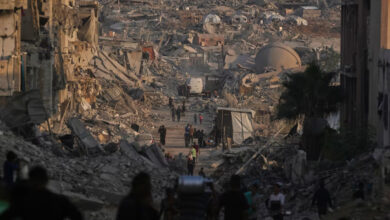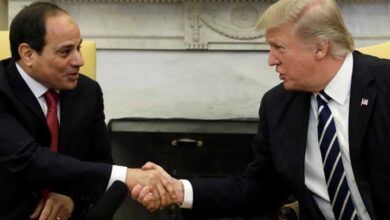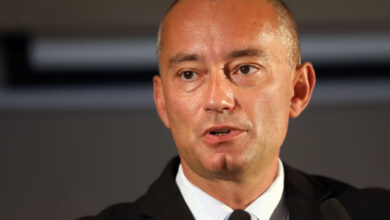
In late August, organizers of the Etel Adnan Award for Women Playwrights announced that their 2012 award would go to Palestinian playwright Valantina Abu Oqsa for “I Am Free.”
Abu Oqsa's play, which tells the stories of Palestinian political prisoners, was recognized for its “creativity in presenting an original theme using captivating language and unusually profound characters,” according to a news release. The play was selected by a panel of Lebanese and Swedish judges.
She was awarded US$5,000 and the opportunity to be translated into English, although the play was already staged in the United States last October. This was the third and final year for the Etel Adnan award, which had previously gone to Lebanese playwright Valerie Kashar and Jordanian playwright Lana Nasr.
Egypt Independent spoke with Abu Oqsa about the origins and development of “I Am Free,” and what the award meant to her.
Egypt Independent: When you began to interview political prisoners, did you have any idea that these interviews would become a play?
Valantina Abu Oqsa: Definitely. I made the decision to meet the women who had been released with the aim of writing and producing a dramatic work.* I put “I Am Free” (Ana Hurra) together after spending the whole of 2010 researching and studying, and met face-to-face with a number of former and current women prisoners who were carefully selected to present a spectrum of prominent figures from the past and present of the Palestinian prison movement.
So I set out down a rocky and perilous path in search, not merely of the facts, but of the very smallest details out of which they were constructed. After all my extensive reading around the subject, I also became convinced that I knew absolutely nothing and wanted to know more. This made me challenge myself by meeting face-to-face with former prisoners. To be honest, these were not meetings so much as a plunge into the unknown. It astonished me and gave enormous weight to the experience.
EI: Did you conceive of this as a play for Palestinians, or for Arabs, or for whom exactly?
Abu Oqsa: In any literary endeavor, it is a mistake to confine yourself by aiming your work at a particular people, region or class. This might not always be the case with plays aimed at schools: in that instance you take into account the age-group for whom you’re writing. But the principle is never for whom you’re writing; the principle is what you’re writing about.
In “I Am Free,” because it involved writing a play derived from documenting stories and eyewitness accounts, the focus was on composing and communicating something in a way that penetrated the prison walls and situated the scenes — any scenes — within this room [with the audience].
I [have] always believed that all peoples’ experiences of all issues are alike. I worked to invent a particular kind of Palestinian theater and prepare myself to write a text inspired by the particularities of the Palestinian condition that could one day attain a global inclusiveness.
EI: Do the attitudes of audiences in Morocco and Jordan toward “I Am Free” differ from those of Palestinians?
Abu Oqsa: Responses were extraordinarily similar, even comparing Arab audiences with those in the United States.
At the end of the performance everyone would be rigid in their seats, [and] then burst into applause after a few beats of silence. It happened at every single performance, without exception, showing that audience reactions from very different parts of the world were identical and testifying to the work’s power and global appeal.
EI: How do you feel about receiving the Etel Adnan Award?
Abu Oqsa: This award, given its status, its timing and its global spread, is simply magnificent. First of all, it bears the name of the great Etel Adnan, who hails from two of the world’s pioneering centers of theater: Beirut’s Al-Madina Theater and the Swedish National Touring Theater (Riksteatern). My immediate reaction was to weep continuously for an entire day, thinking over what the official announcement had said and the words of the judging panel when they met me: “You deserve it!”
I saw a new world, and it took me back to that little 7-year-old girl from a neglected alleyway who wrote in her diary with all the innocence of youth, "I want to be a famous artist!"
My three sisters all have academic degrees and when I got back to Palestine I told my parents that I had brought them an international certificate of my own and they should hang it on the front of the house and be proud of it. I was also conscious of how proud my husband and children would be and all those who have supported me.
EI: Has it changed anything for you?
Abu Oqsa: It has changed things. It’s given me much greater confidence in my work, my abilities and my professionalism. It’s shown me that I can move forward in the direction I choose and encourages me to take advantage of this success by educating myself to produce high-quality work.
EI: Do you believe that a prize like the Etel Adnan Award acts as an encouragement to writers?
Abu Oqsa: The value of the Etel Adnan Award derives from the importance of Adnan, a globally significant artist, and from the one who might win it.
Unfortunately, this is the third and final time the award will be given, and I would hope that anyone interested in producing more prizes of this nature, especially theater prizes, will not be motivated by a desire to encourage female writers but rather to elevate our limited theatrical scene, liberate it from the constraints of place and foreground the importance of theater’s duty to safeguard human society.
EI: Aside from prizes, what can be done to help writers produce better plays?
Abu Oqsa: I don’t believe that prizes should be an end in themselves; they are the result of success, the result of being there in the first place, if I can put it like that. There are many causes of success; many things have to be in place. If we are to excel, there are even more, the most important of which are truth, ambition, persistence, an all-embracing experimentation and absolute professionalism.
EI: Are you pleased that “I Am Free” is going to be translated?
Abu Oqsa: We already translated the text into English for the United States but naturally it’s very different when internationally renowned dramatists decide that your work needs to be translated. Of course, I’m proud and I will work to get it translated into other languages and publish it as well, and then other peoples will be able to access it just as we access texts from around the world.
EI: Will “I Am Free” be performed in Egypt?
Abu Oqsa: A number of people are working to make this happen. I certainly hope so.
EI: What are you working on at the moment?
Abu Oqsa: Right now I’m preparing for performances of “I Am Free” and trying to make the most of its success. At the same time there is a particular subject that I’ve been keen to take on and write about for some time now. It is extremely sensitive and challenging and I will be conducting research and interviews with those involved. I will reveal details of this project later.
Over the next three years I will also be endeavoring to carry out my duties as member of the Managing Committee of Women Playwrights International with responsibility for the Arab world.
*Correction: This article previously stated that Abu Oqsa interviewed women while they were still in prison. She met with them after they were freed.




